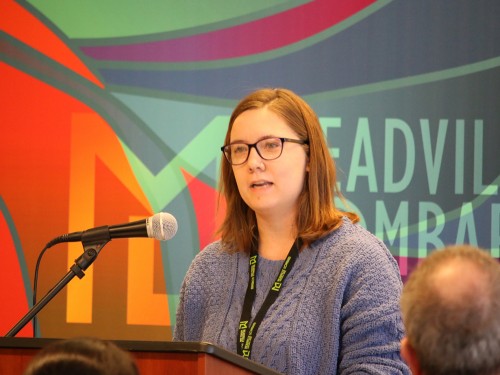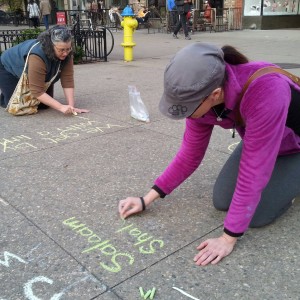Reflection on The Drum Major Instinct, III

Monica Kling-Garcia, a student in Community Studies Signature Course of our MDiv program, offered this reflection to fellow students, faculty, and staff during the MLK service at Meadville Lombard. Hers was the third of four reflections on Dr. King's “The Drum Major Instinct” sermon.
The sacred words of Rev. Dr. Martin Luther King, Jr.’s sermon tell us:
You know [the Drum Major Instinct] can happen with the church; I know churches get in that bind sometimes. I’ve been to churches, you know, and they say, “We have so many doctors, and so many school teachers, and so many lawyers, and so many businessmen in our church.” And that’s fine, because doctors need to go to church, and lawyers, and businessmen, teachers—they ought to be in church. But they say that—even the preacher sometimes will go all through that—they say that as if the other people don't count.
And the church is the one place where a doctor ought to forget that he’s a doctor. The church is the one place where a Ph.D. ought to forget that he's a Ph.D. The church is the one place that the school teacher ought to forget the degree she has behind her name. The church is the one place where the lawyer ought to forget that he's a lawyer. And any church that violates the “whosoever will, let him come” doctrine is a dead, cold church, and nothing but a little social club with a thin veneer of religiosity.
When the church is true to its nature, it says, “Whosoever will, let him come.” And it is not supposed to satisfy the perverted uses of the drum major instinct. It's the one place where everybody should be the same.
I remember vividly the first time I went to a Unitarian Universalist church. I had just come out as bisexual and left Catholicism, so a friend had suggested going to a UU church accepting of my identity. This representation was great and crucial to my own personal healing. However, at that time I was also volunteering at a local meal program at a Catholic parish. The differences I saw in the communities were significant. At the Catholic church, I saw people of all races, ages, and professions together. Many of the homeless who used the meal program would come to church on Sundays, Catholic or not, for the message and community. In contrast, I looked around the UU church and saw primarily white, middle to upper-class individuals. I thought to myself, “Would the people who went to my Catholic mass feel at home here?” I didn’t honestly know.
Here at Meadville Lombard, we talk about our desires to have diverse faith communities where people can feel welcome. But too often in our faith, the Drum Major Instinct gets in our way. How often do we talk about the famous people who went to our church or the ones who have awards? When we talk about how many members our churches have, are we measuring the worth of our community by its metrics, and not by the souls which celebrate with us? How we talk and think about our congregations now will directly affect the future of our faith, and I think we can do better.
Diversity is a word we throw out a lot in Unitarian Universalism right now, but the work of dismantling not just white supremacy but also classism is an empty promise without action. Change needs to happen from within, and that means from within our association, our congregations, and within our own hearts. I challenge us to use our time in seminary to examine the values of ourselves and our congregations so that we can prevent our churches from becoming, as Dr. King says, “a little social club with a thin veneer of religiosity.”

Monica Kling-Garcia
Monica Kling-Garcia is in her first year of our MDiv program, Community Studies Signature Course. She lives near Milwaukee, Wisconsin. Her prior career was in Admissions for a small university, but ministry now allows her to creatively incorporate her true passions: religious studies, globe-trotting, and Star Wars.

